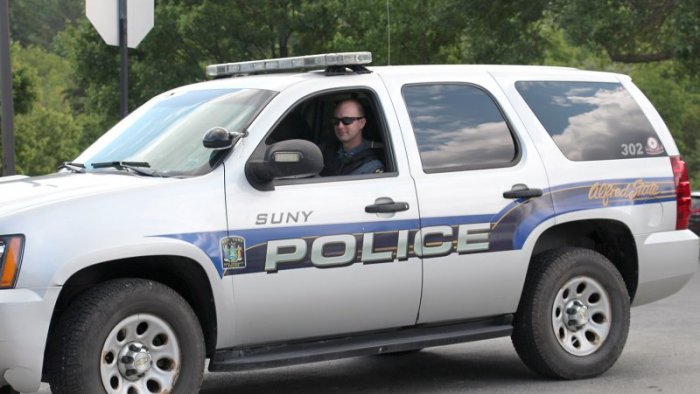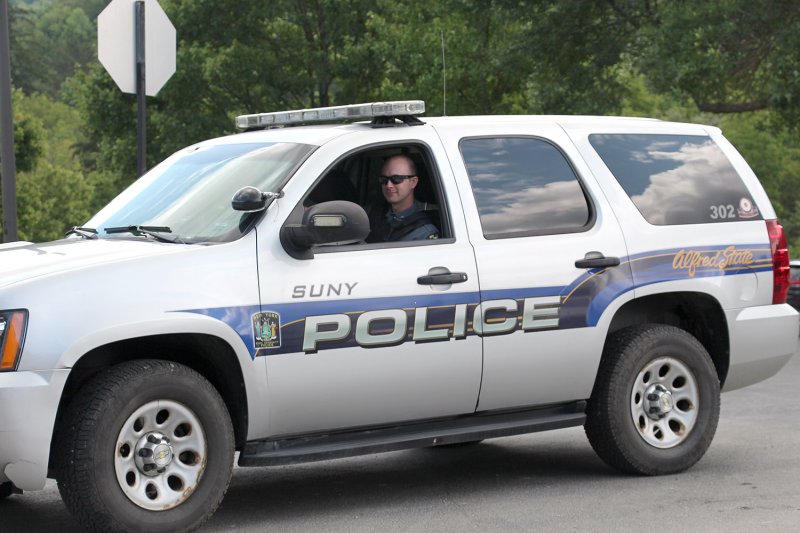
At a glance
 “The academy directly benefits the entire western New York region and provides police departments in Allegany and neighboring counties with high-quality law enforcement training opportunities and access to the corresponding certifications,” said Gregory Sammons, Alfred State vice president for Student Affairs.
“The academy directly benefits the entire western New York region and provides police departments in Allegany and neighboring counties with high-quality law enforcement training opportunities and access to the corresponding certifications,” said Gregory Sammons, Alfred State vice president for Student Affairs.

Looking to provide further training and certification opportunities for current and future law enforcement officers, Alfred State College (ASC) is pleased to announce the opening of its new police academy, pending final state approval.
Running throughout the summer, the Alfred State Police Academy (ASPA) will hold its first class in May, and is designed to serve recruits in both pre-employment (Phase I) and employed (Phase II) stages. Graduates will earn either the Pre-Employment Certificate (Phase I) or the Basic Course for Police Officers Certificate (Phase II).
“The academy directly benefits the entire western New York region and provides police departments in Allegany and neighboring counties with high-quality law enforcement training opportunities and access to the corresponding certifications,” said Gregory Sammons, Alfred State vice president for Student Affairs.
Academy participants will gain knowledge and expertise in New York State laws, investigations, defensive tactics, emergency services and management, emergency vehicle operations, and many more topics as outlined by the New York State curriculum.
The academy will also complement Alfred State’s Associate in Science (AS) and Bachelor of Science (BS) degrees in criminal justice by providing students wanting to work in policing with the opportunity to complete their degree in the same location where they complete their police training curriculum.
“The academy will offer recruits enrolled in our criminal justice degree programs the opportunity to apply up to 12 college credits toward elective requirements in the Bachelor of Science degree program,” Sammons said. “Being able to take advantage of the credits requires early and careful planning by the student in consultation with their faculty adviser.”
During Phase I of the academy, all recruits participate in all training and activities. Phase II, limited to those recruits employed by police agencies, includes modules such as firearms, counter-terrorism, baton/ASP, active shooter training, and standardized field training.
“Once a pre-employment recruit is hired by a police agency,” Sammons said, “the pre-employment graduate may then return to the ASPA to take the remaining course work and the required field training in Phase II and obtain the full police basic certification.”
In order to qualify to participate, pre-employment recruits must:
- Be at least 19 years of age.
- Complete a background check process.
- Meet physical fitness and medical standards requirements.
- Complete an oral interview.
Sworn officers must:
- Be hired by a police department, full- or part-time, prior to enrollment in ASPA and registered as a police officer with New York State’s Division of Criminal Justice Services on the state registry.
- Pass standardized physical fitness tests.
Both the Pre-Employment Certificate and the Basic Course for Police Certificate last for a period of two years. Maintaining active employment as a police officer continuously extends the certificate.
Sammons noted that pre-employment graduates have up to two years to secure a position as a police officer (part- or full-time) in order for the certification to remain valid.
“This is an important consideration in assessing both the risk and timing of your potential attendance in the ASPA,” he said. “Recruits who graduate the program are not guaranteed a job. Graduates of the ASPA would need to apply for employment with police agencies of interest or full-time employment. This typically includes applying and taking civil service examinations to be placed on a candidate list.”

The ASPA will use modern classroom space in the Physical and Health Sciences Building on the Alfred campus. The variety of course work throughout the academy, however, will require that recruits are learning in classrooms, gym, and many external locations to ensure the highest-quality experience for the participants.
While the academy will not require recruits to stay on campus, housing in the brand-new MacKenzie Commons apartments will be offered at a deeply discounted rate of $50 per week. The apartments will be shared, but are single-occupancy bedrooms, and include kitchens.
The course cost for the academy is $4,000 and a $500 non-refundable deposit will be required to secure a space in the program. Final state approval is expected soon.
For more information, contact The Center for Community Education and Training (CCET) at CCET@alfredstate.edu, Tammy Woods Edwards at 607-587-4017, Lt. Jeff Wilcox at WilcoxJP@alfredtstate.edu, or visit www.AlfredState.edu/police-academy.
